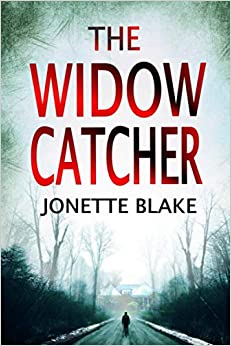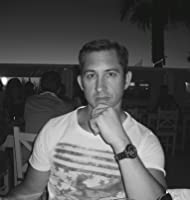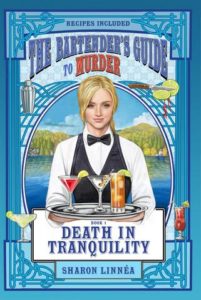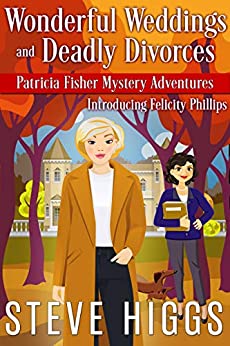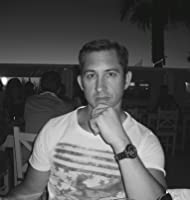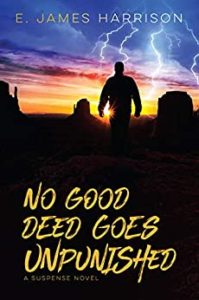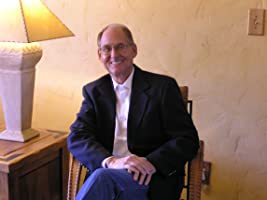The Widow Catcher
February 17th, 2021Retiring to this town could be fatal
Delia Frost loves her job at the bank. She loves her customers, most of whom are elderly. She doesn’t love the idea of quitting her job to travel around Australia in a motor home with her husband who is recovering from a heart attack. And she can’t bring herself to tell him that she doesn’t want to go.
Days before quitting her job, she is invited to a book club meeting, run by a local celebrity. This seems like a beacon of hope, one last chance to do something for herself before she leaves it all behind.
But this isn’t a random invitation.
Delia has been carefully selected by a serial killer to play her part in the murders of elderly widows.
Finding herself caught in a web of lies and murder, and not wanting to believe the killer is someone she knows, Delia is keen to leave this town as fast as she can. Except the killer doesn’t want to let her go.
Sign up for Jonette Blake’s newsletter and download a free ‘mystery-themed word search. Details on the website www.jonetteblake.com.
Jonette Blake writes supernatural thrillers and suspense thrillers. She is the author of over ten books and dozens of short stories, writing as D L Richardson.
?She was born in Ireland and grew up in Australia. She lived through the 80s and music is still a big part of her life. When she is not writing, she plays her piano and guitar, listens to music, reads, and enjoys the beach.
?She has held jobs in administration, sales and marketing, has worked in HR, payroll, and as a bank teller. Her latest novel “The Widow Catcher” is based on the coastal town she lives in and her own bank teller experience.
Read more about her books on her website: http://www.jonetteblake.com
Follow the author on Facebook: https://www.facebook.com/JonetteBlake
Arboath Smokie Slaying
February 15th, 2021On a culinary tour of the British Isles, a retired detective and a failed police dog intend to taste the kippers that made the town famous …
… but when the first person they meet turns up dead a few hours later in an apparent suicide neither one of them believes, both man and dog must accept they’ve stumbled into another mystery.
All too soon, they wish they hadn’t poked their noses in because what they have uncovered could be truly sinister.
Hidden in the past, a crime few know about yearns to be revealed, but there are some who will do anything to ensure the secret never sees the light of day.
Is the slaying finished?
Baking. It can get a guy killed.
ISLALND BREEZES
Albert, a retired detective, and Rex, a former police dog whose attitude got him bounced from the force, are touring around England to taste and learn to make some of Albert’s favorite foods. Rex’s favorite foods are anything edible.
The smokies take him over into Scotland’s historic Arbroath to find this favorite. It turned into a very fishy visit.
Rex can always find the clues and criminal before Albert. Rex can’t understand why his human can’t smell what’s right in front of him.
Poor Rex manages to irritate a bunch of seagulls who then target him often enough that he becomes paranoid. He needs to form a gang to take them down, but the other dogs are afraid of those birds.
Albert is also on the trail of a gastrothief who keeps abducting the best of the best in every town and village to which Albert ventures. Will a chef or someone be abducted in Arbroath?
Thank you, Mr Higgs, for giving us Albert and Rex.
***Book received from the author without charge.***
When Steve Higgs wrote his debut novel, Paranormal Nonsense, he was a Captain in the British Army. He would love to pretend that he had one of those careers that has to be redacted and in general denied by the government and that he has had to change his name and continually move about because he is still on the watch list in several countries. In truth though, he started out as a mechanic, no not like Jason Statham, sneaking about as a contract killer, more like one of those greasy gits that charge you a fortune and keep your car for a week when all you went in for was a squeaky door hinge.
At school, he was mostly disinterested in every subject except creative writing, for which, at age ten, he won his first award. However, calling it his first award suggests that there have been more, which there have not. Accolades may come but, in the meantime, he is having a ball writing mystery stories and crime thrillers and claims to have more than a hundred books forming an unruly queue in his head as they clamor to get out.
Now retired from the military, he lives in the south-east corner of England with a trio of lazy sausage dogs. Surrounded by rolling hills, brooding castles and vineyards, he doubts he will ever leave, the beer is just too good.
Death in Tranquility
February 14th, 2021Death In Tranquility
by Sharon Linnéa
February 1-28, 2021 Tour
Synopsis:

No one talks to the cops. Everyone talks to the bartender. And Avalon Nash is one hell of a bartender.
Avalon is on the run from her life in Los Angeles. Having a drink while waiting to change trains in the former Olympic town of Tranquility, New York, she discovers the freshly murdered bartender at MacTavish’s. A bartender herself, she’s offered the position with the warning he wasn’t the first MacTavish’s bartender to meet a violent end.
Avalon’s superpower is collecting people’s stories, and she’s soon embroiled in the lives of artists, politicians, ghost hunters and descendants of Old Hollywood.
Can Avalon outrun the ghosts of her past, catch the ghosts of Tranquility’s past and outsmart a murderer?
The first book in the Bartender’s Guide to Murder series offers chills, laughs, and 30 of the best drink recipes ever imbibed.
Book Details:
Genre: Mystery
Published by: Arundel Publishing
Publication Date: September 29th 2020
Number of Pages: 323
ISBN: 9781933608 (ISBN13: 9781933608150)
Series: Bartender’s Guide to Murder, 1 (Click here to check out other books in the series!)
Purchase Links: Amazon | Barnes & Noble | The Bookstore Plus | Goodreads
ISLAND BREEZES
Tranquility seems to be the place where people decide to stay when originally they were only waiting to change trains. By stay, I mean end up living there.
That’s what happened to Avalon when the town suddenly needed a new bartender.
It’s a town with secrets and murder. In order to solve the murder, the secrets have to come out. Avalon ends up being the one who collects the secrets.
Can she also solve the murders – both present day and one decades old?
You’ll find a cocktail recipe at the end of each chapter.
I enjoyed getting to know Avalon and Tranquility. I’m looking forward to reading more books set in this interesting town. Thank you, Ms Linnea.
***Book provided without charge by PICT. ***
Read an excerpt:
Chapter 1
Death in the Afternoon
“Whenever you see the bartender, I’d like another drink,” I said, lifting my empty martini glass and tipping it to Marta, the waitress with teal hair.
“Everyone wants another drink,” she said, “but Joseph’s missing. I can’t find him. Anywhere.”
“How long has he been gone?” I asked.
“About ten minutes. It’s not like him. Joseph would never just go off without telling me.”
That’s when I should have done it. I should have put down forty bucks to cover my drink and my meal and left that magical, moody, dark-wood paneled Scottish bar and sauntered back across the street to the train station to continue on my way.
If I had, everything would be different.
Instead I nodded, grateful for a reason to stand up. A glance at my watch told me over half an hour remained until my connecting train chugged in across the street. I could do Marta a solid by finding the bartender and telling him drink orders were stacking up.
Travelling from Los Angeles to New York City by rail, I had taken the northern route, which required me to change trains in the storied village of Tranquility, New York. Once detrained, the posted schedule had informed me should I decide to bolt and head north for Montreal, I could leave within the hour. The train heading south for New York City, however, would not be along until 4 p.m.
Sometimes in life you think it’s about where you’re going, but it turns out to be about where you change trains.
It was an April afternoon; the colors on the trees and bushes were still painting from the watery palate of spring. Here and there, forsythia unfurled in insistent bursts of golden glory.
I needed a drink.
Tranquility has been famous for a long time. Best known for hosting the Winter Olympics back in 19-whatever, it was an eclectic blend of small village, arts community, ski mecca, gigantic hotels and Olympic facilities. Certainly there was somewhere a person could get lunch.
Perched on a hill across the street from the station sat a shiny, modern hotel of the upscale chain variety. Just down the road, father south, was a large, meandering, one-of-a-kind establishment called MacTavish’s Seaside Cottage. It looked nothing like a cottage, and, as we were inland, there were no seas. I doubted the existence of a MacTavish.
I headed over at once.
The place evoked a lost inn in Brigadoon. A square main building of a single story sent wings jutting off at various angles into the rolling hills beyond. Floor-to-ceiling windows made the lobby bright and airy. A full suit of armor stood guard over the check-in counter, while a sculpture of two downhill skiers whooshed under a skylight in the middle of the room.
Behind the statue was the Breezy, a sleek restaurant overlooking Lake Serenity (Lake Tranquility was in the next town over, go figure). The restaurant’s outdoor deck was packed with tourists on this balmy day, eating and holding tight to their napkins, lest they be lost to the murky depths.
Off to the right—huddled in the vast common area’s only dark corner—was a small door with a carved, hand-painted wooden sign which featured a large seagoing vessel plowing through tumultuous waves. That Ship Has Sailed, it read. A tavern name if I ever heard one.
Beyond the heavy door, down a short dark-wood hallway, in a tall room lined with chestnut paneling, I paused to let my eyes adjust to the change in light, atmosphere, and, possibly, century.
The bar was at a right angle as you entered, running the length of the wall. It was hand-carved and matched the back bar, which held 200 bottles, easily.
A bartender’s dream, or her undoing.
Two of the booths against the far wall were occupied, as were two of the center tables.
I sat at the bar.
Only one other person claimed a seat there during this low time between meal services. He was a tall gentleman with a square face, weathered skin, and dark hair pulled back into a ponytail. I felt his cold stare as I perused the menu trying to keep to myself. I finally gave up and stared back.
“Flying Crow,” he said. “Mohawk Clan.”
“Avalon,” I said. “Train changer.”
I went back to my menu, surprised to find oysters were a featured dish.
“Avalon?” he finally said. “That’s—”
“An odd name,” I answered. “I know. Flying Crow? You’re in a Scottish pub.”
“Ask him what Oswego means.” This was from the bartender, a lanky man with salt-and-pepper hair. “Oh, but place your order first.”
“Are the oysters good?” I asked.
“Oddly, yes. One of the best things on the menu. Us being seaside, and all.”
“All right, then. Oysters it is. And a really dry vodka martini, olives.”
“Pimento, jalapeño, or bleu cheese?”
“Ooh, bleu cheese, please.” I turned to Flying Crow. “So what does Oswego mean?”
“It means, ‘Nothing Here, Give It to the Crazy White Folks.’ Owego, on the other hand means, ‘Nothing Here Either.’”
“How about Otego? And Otsego and Otisco?”
His eyebrow raised. He was impressed by my knowledge of obscure town names in New York State. “They all mean, ‘We’re Just Messing with You Now.’”
“Hey,” I said, raising my newly delivered martini. “Thanks for coming clean.”
He raised his own glass of firewater in return.
“Coming clean?” asked the bartender, and he chuckled, then dropped his voice. “If he’s coming clean, his name is Lesley.”
“And you are?” I asked. He wasn’t wearing a name tag.
“Joseph.”
“Skål,” I said, raising my glass. “Glad I found That Ship Has Sailed.”
“That’s too much of a mouthful,” he said, flipping over the menu. “Everyone calls it the Battened Hatch.”
“But the Battened Hatch isn’t shorter. Still four syllables.”
“Troublemaker,” muttered Lesley good-naturedly. “I warned you.”
“Fewer words,” said Joseph with a smile that included crinkles by his eyes. “Fewer capital letters over which to trip.”
As he spoke, the leaded door banged open and two men in chinos and shirtsleeves arrived, talking loudly to each other. The door swung again, just behind them, admitting a stream of ten more folks—both women and men, all clad in business casual. Some were more casual than others. One man with silvering hair actually wore a suit and tie; another, a white artist’s shirt, his blonde hair shoulder-length. The women’s garments, too, ran the gamut from tailored to flowing. One, of medium height, even wore a white blouse, navy blue skirt and jacket, finished with hose and pumps. And a priest’s collar.
“Conventioneers?” I asked Joseph. Even as I asked, I knew it didn’t make sense. No specific corporate culture was in evidence.
He laughed. “Nah. Conference people eat at the Blowy. Er, Breezy. Tranquility’s Chamber of Commerce meeting just let out.” His grey eyes danced. “They can never agree on anything, but their entertainment quotient is fairly high. And they drive each other to drink.”
Flying Crow Lesley shook his head.
Most of the new arrivals found tables in the center of the room. Seven of them scooted smaller tables together, others continued their conversations or arguments in pairs.
“Marta!” Joseph called, leaning through a door in the back wall beside the bar.
The curvy girl with the teal hair, nose and eyebrow rings and mega eye shadow clumped through. Her eyes widened when she saw the influx of patrons.
Joseph slid the grilled oysters with fennel butter in front of me. “Want anything else before the rush?” He indicated the well-stocked back bar.
“I’d better hold off. Just in case there’s a disaster and I end up having to drive the train.”
He nodded knowingly. “Good luck with that.”
I took out my phone, then re-pocketed it. I wanted a few more uncomplicated hours before re-entering the real world. Turning to my right, I found that Flying Crow had vanished. In his stead, several barstools down, sat a Scotsman in full regalia: kilt, Bonnie Prince Charlie jacket and a fly plaid. It was predominantly red with blue stripes.
Wow. Mohawk clan members, Scotsmen, and women priests in pantyhose. This was quite a town.
Joseph was looking at an order screen, and five drinks in different glasses were already lined up ready for Marta to deliver.
My phone buzzed. I checked caller i.d. Fought with myself. Answered.
Was grabbed by tentacles of the past.
When I looked up, filled with emotions I didn’t care to have, I decided I did need another drink; forget driving the train.
The line of waiting drink glasses was gone, as were Marta and Joseph.
I checked the time. I’d been in Underland for fifteen minutes, twenty at the most. It was just past three. I had maybe forty-five minutes before I should move on.
That was when Marta swung through the kitchen door, her head down to stave off the multiple calls from the center tables. She stood in front of me, punching information into the point of sale station, employing the NECTM—No Eye Contact Tactical Maneuver.
That’s when she told me Joseph was missing.
“Could he be in the restroom?”
“I asked Arthur when he came out, but he said there was nobody else.”
I nodded at Marta and started by going out through the front hall, to see if perhaps he’d met someone in the lobby. As I did a lap, I overheard a man at check-in ask, “Is it true the inn is haunted?”
“Do you want it to be?” asked the clerk, nonplussed.
But no sign of the bartender.
I swung back through into the woodsy-smelling darkness of the Battened Hatch, shook my head at the troubled waitress, then walked to the circular window in the door. The industrial kitchen was white and well-lit, and as large as it was, I could see straight through the shared kitchen to the Breezy. No sign of Joseph. I turned my attention back to the bar.
Beyond the bar, there was a hallway to the restrooms, and another wooden door that led outside. I looked back at Marta and nodded to the door.
“It doesn’t go anywhere,” she said. “It’s only a little smoker’s deck.”
I wondered if Joseph smoked, tobacco or otherwise. Certainly the arrival of most of a Chamber of Commerce would suggest it to me. I pushed on the wooden door. It seemed locked. I gave it one more try, and, though it didn’t open, it did budge a little bit.
This time I went at it with my full shoulder. There was a thud, and it wedged open enough that I could slip through.
It could hardly be called a deck. You couldn’t put a table—or even a lounge chair—out there.
Especially with the body taking up so much of the space.
It was Joseph. I knelt quickly and felt for a pulse at his neck, but it was clear he was inanimate. He was sitting up, although my pushing the door open had made him lean at an angle. I couldn’t tell if the look on his face was one of pain or surprise. There was some vomit beside him on the deck, and a rivulet down his chin. I felt embarrassed to be seeing him this way.
Crap. He was always nice to me. Well, during the half an hour I’d known him, he had been nice to me.
What was it with me discovering corpses? It was certainly a habit of which I had to break myself.
Meanwhile, what to do? Should I call in the priest? But she was within a group, and it would certainly start a panic. Call 911?
Yes, that would be good. That way they could decide to call the hospital or the police or both.
My phone was back in my purse.
And, you know what? I didn’t want the call to come from me. I was just passing through.
I pulled the door back open and walked to Marta behind the bar. “Call 911,” I said softly. “I found Joseph.”
It took the ambulance and the police five minutes to arrive. The paramedics went through first, then brought a gurney around outside so as to not freak out everyone in the hotel. They loaded Joseph on and sped off, in case there was anything to be done.
I knew there wasn’t.
The police, on the other hand, worked at securing the place which might become a crime scene. They blocked all the doorways and announced no one could leave.
I was still behind the bar with Marta. She was shaking.
“Give me another Scotch,” said the Scotsman seated there.
I looked at the bottles and was pleasantly surprised by the selection. “I think this calls for Black Maple Hill,” I said, only mildly surprised at my reflexive tendency to upsell. The Hill was a rich pour but not the absolute priciest.
He nodded. I poured.
I’m not sure if it was Marta’s tears, or the fact we weren’t allowed to leave, but local bigwigs had realized something was amiss.
“Excuse me,” the man in the suit came to the bar. “Someone said Joseph is dead.”
“Yes,” I said. “He does seem to be.”
Marta swung out of the kitchen, her eyeliner half down her face. “Art, these are your oysters,” she said to the man. He took them.
“So,” he continued, and I wondered what meaningful words he’d have to utter. “You’re pouring drinks?”
It took only a moment to realize that, were I the owner of this establishment, I’d find this a great opportunity.
“Seems so,” I said.
“What goes with oysters?” he asked.
That was a no-brainer. I’d spied the green bottle of absinthe while having my own meal. I poured about three tablespoons into the glass. I then opened a bottle of Prosecco, poured it, and waited for the milky cloud to form.
He took a sip, looked at me, and raised the glass. “If I want another of these, what do I ask for?”
As he asked, I realized I’d dispensed one of Ernest Hemingway’s favorite libations. “Death in the Afternoon,” I replied.
He nodded and went back to his table.
It was then I realized I wasn’t going to make my train.
* *
Ernest Hemingway’s Death in the Afternoon
Ingredients
• 3 tablespoons (1 1/2 ounces) absinthe
• ½ to ¾ cup (4 to 6 ounces) cold Champagne or sparkling wine
Method
Hemmingway’s advice, circa 1935: “Pour one jigger absinthe into a Champagne glass. Add iced Champagne until it attains the proper opalescent milkiness. Drink three to five of these slowly.”
Chapter 2
No Known Address
Since I found the body, I got to talk to the lead investigator.
He was in his mid-thirties, just under six feet, walnut skin, black hair cut short. He would have benefitted from a beard. He looked ripped; the king of ripped you got from taking out your frustrations in the gym. His demeanor was no-nonsense.
“Investigator Spaulding,” he said, and he pulled out a notebook. “State Police.”
“State Police? Isn’t that the same as State Troopers? Don’t you manage highways?”
He stopped writing in his small, leather-covered notebook and looked up.
“Common misconception. The local P.D. is small—only 9 on staff. When something big happens, they ask for assistance.”
“They ask?”
“It’s a dance.”
I wasn’t a suspect (yet), so he didn’t need to write down my stats, but I could read upside down as he made notes. He asked my name, and began guessing at the rest. Nash, Avalon. Female. Caucasian. Blonde hair. 5’7 was his guess at my height. The next thing he wrote down could go seriously south, so I said, “healthy weight.”
He looked up.
“5’7” and at a healthy weight,” I supplied. “If I’m charged with something, we’ll get more specific.”
“Age?”
Did he really need to know all of this? “Twenties,” I said, waiting to see if he’d have the gall to object. He didn’t.
“Best way to reach you?”
I gave him my cell number.
“Permanent address?”
“I don’t have one.”
He looked up.
“I’m in the process of moving from California to New York. I’m only in town to change trains. I don’t have a New York address yet.”
“A relative’s address?”
I held up my phone. “This is your golden ticket,” I said. “If you want to reach me, this is it.”
I saw him write ‘no known address.’ Yep, that pretty much summed it up. I glanced at my watch. Seven minutes until my train pulled into—and, soon after, departed from—the station.
“Um, Detective,” I started.
“Investigator Spaulding,” he corrected.
“Investigator Spaulding, my train is about to arrive. I don’t know anything except what I’ve told you. I came in for a drink and helped Marta find the bartender, whom I hope died of a massive heart attack—well, of natural causes. You know what I mean.”
At that point, his phone buzzed and he gave me a just-a-minute finger. He answered, listened for a while, and started to write. Then he hung up, flipped his notebook shut and said, “I can’t let you leave. He was murdered.”
“Great,” I said, the tone somewhere between rueful and intrigued, as I headed back toward Marta, then I turned back toward Investigator Spaulding. “Can I continue to pour drinks?”
He considered less than a moment. “By all means, serve truth serum to anyone who will imbibe.”
Then he turned and walked toward the other officers.
I went to stand with Marta behind the bar. In my imagination, I heard the train chug in across the street.
Investigator Spaulding cleared his throat, and the room went silent. “Ladies and gentlemen,” he said. “This is now a homicide investigation.” He had to pause as everyone shuffled or gasped, or cried out. “Please do not leave until we have taken your statement.”
A woman in her fifties came and sat down in front of me at the bar. Her hair was in a no-fuss bob, she wore a free-flowing skirt with a linen jacket, both of which were in style twenty years ago, but they worked on her. “Got anything stronger than those Death things?” she asked. “I’m not big on Champagne.”
“Sure.” I said. I sized her up. “Layers in a martini glass work for you?”
“Honey, it’s the strength, not the glass.” She looked shaken and sad. I went for the rums and found Malibu Black, the stronger brother of the original. What a bartender Joseph must have been! I decided to try something new. Malibu Black, mango pineapple vodka, and pineapple juice. I mixed it over ice, shook, and poured. I sank some Chambord and topped it with Jägermeister Spice.
“See if this does it,” I said.
Her hand shook slightly as she held up the glass, appreciated the layers, and then took a sip. The jury was out. She took another. She nodded and smiled.
It occurred to me that everyone in the room knew Joseph. They’d lost one of their own.
Another woman in skinny white pants and a white shell with a fancy pink sports jacket came and sat next to her. They were about the same age, if I had to guess, but the new woman was thin as a rail, muscular, and with her blonde hair in a ponytail. I was guessing she colored her hair not from a darker shade, but to cover the white. The two women embraced. “Suzanne,” said the new arrival.
“Gillian,” said no-fuss-bob Suzanne. Then, “Can’t believe it.”
“I can’t, either,” replied hard-bodied Gillian. She had the remains of an Eastern European accent. They sat a respectful moment. “What are you drinking?”
Suzanne looked at me. “No Known Address,” I said.
“Okay,” Gillian said. “I’ll have one.” She then turned and I was dismissed to my task.
“I can’t believe it. One of the only straight, available guys between forty and crotchety, and he’s gone!” said Suzanne.
“There’s Mike,” Gillian said, tilting her head toward the state police investigator. “And I’m not sure Joseph was available.”
“First, really? Maybe if he worked out. Second, you or I crook our little fingers and get a guy away from Sophie.” They both looked back, shooting daggers toward one of the three women in the center wall booth. I knew which must be Sophie, as one of them was crying copiously while the other two petted her solicitously.
“And do we have a suspect?” asked pink jacket Gillian.
This time, they looked at a younger woman who sat at a table with two newly arrived Chamber men. She was gorgeous—skin the color of chai latte and hair as dark as a sky at new moon. She was staring off into space.
I almost said, “You know I can hear you.” But maids, taxi drivers, and bartenders… well, we’re invisible, which is partly how we get the good gossip.
They stopped talking abruptly as two men approached. “Can we get some food?” asked the first. He was in a polo and navy blue slacks.
I heard snuffling and saw that Marta was in the shadows, leaning back against the wall. “Hey,” I said, “would you ask the chef if we can continue to order food?”
She nodded and swung through the kitchen door.
Arthur, the man in the suit who had ordered earlier, accompanied the newcomer in the polo. Arthur addressed his companion in an audible hiss. “I’m telling you… we can’t let word of this get out. Tranquility has to be considered a safe haven. For everyone. For…the festival folks. It’s part of what lures them here. Change of pace.”
“How do we not let the word get out? It’s a matter of record! And everyone in town knows about it—or will, within minutes.”
From the furious pace of thumbs texting throughout the room, it was clear he was correct.
“I mean, don’t print this as front-page news.”
“It is front page news, Art. And, the film festival folks are already committed. They’ve submitted their films. They’ll come.”
Marta returned with a positive nod. I slapped down two menus. “Marta will be out to take your order,” I said. As they turned, I added. “And if it’s a film festival, you don’t need to worry. Film people eat news like this for breakfast.”
Arthur looked at me in surprise, but gave a raised-eyebrows look that inferred I could have a point.
They left with the menus and I turned back to Marta, trying to help get her mind on something other than her boss’s death. “Can you help me add these drinks to people’s tabs?” I nodded toward the POS.
For the record, I hate point of sale machines. Each one hates humans in its own unique way. I pointed at people and she pulled up their tabs and showed me how to input the drinks I’d served.
I only had the Scotsman’s tab left undone when the man in the artist’s shirt stopped right before me. He was likely late 40s and had a face that was long but not unattractive. His shoulders were unusually broad, and he exuded self-confidence and a self-trained impishness. His shirt had one too many buttons left undone.
“Okay,” he said, “I wasn’t going to drink, but Joe…”
“You weren’t going to drink because it’s late afternoon, or because you’ve been sober for seven months?” I had no interest in tipping someone off the wagon.
He laughed. “I haven’t been drinking because this isn’t my favorite crowd,” he said. “And I don’t usually drink. But murder seems an excuse, if there ever was one.” He extended his hand. “Michael Michel,” he said, and smiled, waggling his eyebrows as if this should mean something to me.
I took his hand and shook. It was apparent I didn’t recognize him.
“The Painter Who Brings You Home,” he said, and the trademark practically bled from the words.
“Right,” I said, trying to sound impressed. “Nice to meet you. I’m Avalon. What’ll ya have?”
“Vodka tonic lime.”
“Care which vodka?”
He shook his head while saying, “Whatever you’ve got. Grey Goose.”
Ah, a fellow who pretended not to drink, who knew exactly what he wanted.
I poured and went for the garnish tray. The limes were gone. I looked at the back bar and found lemons and oranges. No limes, though clearly there had been some. I walked along the front bar and found, below patron eye level, a small cutting board with a lime on it. The lime was half-cut, some of them in rounds, a few in quarters. Some juice was dripping down onto the floor.
I reached for a wedge, and then I stopped short.
Joseph never would have left this on purpose. It was obviously what he’d been doing when he was interrupted by death—or someone who led him to his death. Or by symptoms that eventually spelled death.
I leaned down and sniffed.
It was lime-y. But there was something else, also.
I backed away. I walked over to Marta and said, quietly, “Don’t let anyone near that end of the bar.”
Then I walked over to Investigator Spaulding, where he sat at a booth interviewing someone. “Investigator?” I said. “Sorry to interrupt, but this is important.”
He looked at me, squinting, then seemed surprised, since I’d made such a point of being Ms. Just-Passing-Through.
He stood up and stepped away from the booth.
“I believe I’ve found the murder weapon,” I said.
As we walked together, I realized that the door to the smoker’s porch sat open. It was crawling with half a dozen or so more crime scene people.
Together we walked to the limes. I said, “Don’t touch them. If this is what Joseph was doing when he died, if they are poisoned, my guess is that the poison can be absorbed through the skin.”
Investigator Spaulding looked at me like, Of course I knew that, but he stepped back. As another officer and two crime scene investigators came over, I backed away, removing myself as far as possible from the action.
I returned to the Artist Shirt. “I think today we’re going with a lemon and a cherry,” I said. I smelled them before putting them in the drink.
It struck me then that perhaps Joseph hadn’t been the intended target. Maybe there was someone who consistently ordered a drink garnished with lime, and the murderer had injected the poison into the lime, not realizing it could be absorbed as well as ingested.
Like, for instance, the man before me, Mr. Vodka Tonic Lime.
Still, this was a pretty non-specific way of poison delivery. The limes could have been served to half a dozen people before anyone realized they were toxic. Who would do something like that?
The police were letting people go once they had been interviewed. I asked Investigator Spaulding if I could go. He nodded, adding, “Please stay in town until tomorrow morning, in case we have any further questions.”
As if I had a choice. All the trains had gone, except the 11 p.m. to Montreal.
The bar had been sealed off with crime-scene tape, a welcome relief as I didn’t relish closing a dead man’s station on the night of his murder. Why would I even think that? I didn’t work here. But my need to leave a bar in pristine condition ran down to bone and marrow.
As I headed for my bag, which I’d left on my original stool, I saw I wouldn’t even be allowed to access the POS machine.
The only patron whose drink I hadn’t input was the man in the kilt. I looked around the emptying room to find he’d moved to a pub table over to the side. “Sorry, sir,” I said. “I wasn’t able to enter your drinks into the machine. I guess you’re on the honor system to pay up another day.”
He gave a small smile. “Lass,” he said, “I’m Glenn MacTavish. Owner of this place. Seems I’m out a bartender and will be needing another. You have any interest?” he asked.
I stopped and stared. “There’s really a MacTavish?” I asked.
“Aye, and you’re looking at him.”
“But… you don’t know anything about me.”
“You keep a clear head and you know what you’re doin’. That’s all I really need to know. Besides, you don’t know anything about me, either.”
“I, well—thank you for the offer. It’s a beautiful bar. Can I think on it overnight? I’ve been told not to leave town.”
“Aye,” he said. “You can tell me in the mornin’ if you might be stayin.’ And while you’re decidin’, I could pay you for your services tonight with a room here at the hotel.”
That seemed fair. The Hotel Tonight app was offering me a room at a local chain. Staying at MacTavish’s Seaside Cottage for free seemed infinitely more attractive. “All right,” I said. “I should probably let you know they’re expecting me in New York City.”
“All right,” he said. “I should probably let you know Joseph isn’t the first bartender to work here who’s been murdered.”
* *
No Known Address
Ingredients
• ½ oz. Malibu black
• 2 dashes Chambord
• ½ oz. mango pineapple vodka
• 2 dashes Jägermeister Spice
• 1 oz. pineapple juice
Method
Shake pineapple vodka, Malibu Black and pineapple juice over ice and strain evenly into martini glasses.
Sink a dash of Chambord into each flute by running it down the side of the glass.
Layer a dash of Jägermeister Spice in each glass.
***
Excerpt from Death in Tranquility by Sharon Linnéa. Copyright 2020 by Sharon Linnéa. Reproduced with permission from Sharon Linnéa. All rights reserved.
Author Bio:

Sharon Linnéa wrote the bestselling Eden Series (Chasing Eden, Beyond Eden, Treasure of Eden and Plagues of Eden) with B.K. Sherer, as well as the standalone These Violent Delights, a movie murder series. She enjoyed working with Axel Avian on Colt Shore: Domino 29, a middle-grade spy thriller. She is also the author of Princess Ka’iulani: Hope of a Nation, Heart of a People about the last crown princess of Hawaii which won the prestigious Carter Woodson Award, and Raoul Wallenberg: the Man Who Stopped Death. She was a staff writer for five national magazines, a book editor at three publishers, and a celebrity ghost. She lives outside New York City with her family. In Orange County, she teaches The Book Inside You workshops with Thomas Mattingly.
Catch Up With Sharon On:
www.SharonLinnea.com
BartendersGuidetoMurder.com
Goodreads
BookBub
Instagram
Twitter
Facebook
Tour Participants:
Visit these other great hosts on this tour for more great reviews, interviews, guest posts, and giveaways!
Enter To Win!:
This is a rafflecopter giveaway hosted by Partners in Crime Virtual Book Tours for Sharon Linnéa. There will be SIX (6) winners: ONE (1) winner will receive one (1) Amazon.com Gift Card and FIVE (5) winners will each receive one (1) copy of Death In Tranquility by Sharon Linnéa (These five (5) winners will have their choice of eBook or Print edition however print editions will only be shipped to U.S. addresses). The giveaway begins on February 1, 2021 and runs through March 2, 2021. Void where prohibited.
Get More Great Reads at Partners In Crime Virtual Book Tours
Wonderful Weddings and Deadly Divorces
February 14th, 2021In the book fans have all been waiting for, Patricia will finally settle her divorce from cheating rat of a husband, Charlie. But will it go her way?
Charlie has a crack team of lawyers on his side, all eager to get their hands on the enormous wealth Patricia has amassed. Patricia’s been too busy staying alive to organise her own team so all she has is her ruthless cunning.
Will that be enough?
However, as the divorce meeting looms, Patricia calls in some favours to arrange a wedding for on-board friends, Lieutenants Bhukari and Baker.
Did she ‘accidentally’ arrange for it to be at the same venue on the same day as arch-rival Angelica Howard-Box holds the wedding of the year for her son?
Oops.
The fur will fly but before it can, Patricia and team uncover something sinister afoot and to save the day, they might just have to save themselves … and Angelica.
Solving mysteries can be murder.
ISLAND BREEZES
Patricia Fisher just wants to enjoy a quiet weekend with her captain. Is that too much to ask for? Maybe.
While at Loxton Hall preparing for a wedding of friends the back of her scalp begins to itch. If this isn’t your first Patricia Fisher book, you know what this means.
Trouble is brewing and Patricia just wants to ignore it. After all, this weekend is supposed to be a bit of a holiday.
She can’t escape it. Often that itch means a body will show up. Sometimes it’s an enemy she made while just a child.
Two weddings are supposed to happen there. Will they?
Thank you, Mr. Higgs, for another enjoyable book.
***Book provided without charge by the author.***
When Steve Higgs wrote his debut novel, Paranormal Nonsense, he was a Captain in the British Army. He would love to pretend that he had one of those careers that has to be redacted and in general denied by the government and that he has had to change his name and continually move about because he is still on the watch list in several countries. In truth though, he started out as a mechanic, no not like Jason Statham, sneaking about as a contract killer, more like one of those greasy gits that charge you a fortune and keep your car for a week when all you went in for was a squeaky door hinge.
At school, he was mostly disinterested in every subject except creative writing, for which, at age ten, he won his first award. However, calling it his first award suggests that there have been more, which there have not. Accolades may come but, in the meantime, he is having a ball writing mystery stories and crime thrillers and claims to have more than a hundred books forming an unruly queue in his head as they clamor to get out.
Now retired from the military, he lives in the south-east corner of England with a trio of lazy sausage dogs. Surrounded by rolling hills, brooding castles and vineyards, he doubts he will ever leave, the beer is just too good.
Unity
February 13th, 2021No Good Deed Goes Unpunished
February 9th, 2021Synopsis:
Five years ago, US Air Force pararescue jumper Garrett Shepherd saved a stranger’s life. Now that man, Edwin Sprague, is dead—and he’s left Garrett millions of dollars as thanks. But there’s a catch: Edwin has a task for Garrett to complete that will double his money—if he survives: Edwin wants revenge from beyond the grave, and he wants Garrett to get it for him.
Garrett agrees to give the bizarre challenge one week of his time, but he’s quickly pulled into a dangerous world of scandal, bribery, and secrets some would kill to keep hidden. He has attracted the attention of some very powerful people—people who have destroyed their enemies before and will not hesitate to do so again. With the help of a Navajo policeman and a beautiful lawyer, Garrett’s investigation leads him deep into the Navajo reservation—but uncovering the information he’s hunting for proves to be a deadly quest.
Book Details:
Genre: Mystery, Suspense
Published by: Covenant Communications
Publication Date: January 5, 2021
Number of Pages: 304
ISBN: 9781524413545
Series: No Good Deed Goes Unpunished is not a part of a series.
Purchase Links: Amazon | Barnes & Noble | Goodreads
Read an excerpt:
Edwin Sprague knew he was a dead man walking the instant he was sucker punched in his kidney and a blanket was thrown over his head.
The only question rumbling through his mind as his hands were zip-tied behind him and he was shoved into a vehicle was whether it would be a quick bullet to the head or painfully slow as they tortured him to talk. He was hoping for the bullet, but that hope evaporated when he felt a needle plunged deep into his right bicep. Within a moment, the semidarkness of the blanket turned to the complete black of unconsciousness.
When his consciousness returned, it came all jumbled and in bits and pieces, like someone channel surfing with a remote control. One second, there was a memory of him standing beside an abandoned Navajo hogan in Beclabito, Arizona, and the next, it was a vague image of two men dressed in desert camo. Then, as if someone had hit the rewind button, he was in the middle of a conversation with his wife or arguing with his son about a boat.
Water splashing on his face abruptly stopped the channel surfing and pulled him to the here and now. He was lying spread-eagled on his back on the ground with what felt like a thousand sharp rocks digging into him.
Above him, a gravelly voice said, “Wake up, old man.”
The water was splatting on his forehead and running into his eyes and trickling down the side of his face before dribbling into his ears. Edwin tried shifting his head sideways to get out of the water, but it wouldn’t move. Then he tried lifting his right hand to block the flow, but it stayed as still as if it were nailed to the ground. He tried moving his left hand and got the same result.
There was a slight chuckle, and the miniature waterfall stopped. After blinking several times and squinting against the sunlight, Edwin’s vision cleared enough for him to see a man standing above him holding a half empty water bottle. He watched as the man tipped the water bottle and a thin stream of water cascaded toward him, splashed onto his forehead, and again filled his eyes and ears. Frustrated and angry, he tried rolling onto his side, but he couldn’t move.
The man gave a quick nasally laugh and continued pouring the water.
“Come on, old man,” he taunted, “don’t just lay there; get up and make me stop. You’re supposed to be this tough old dude, but you don’t look so tough to me.” Then, pouring the water faster, he said, “You know, if you’d ask me to stop, I’d stop. How about it? You want me to stop?”
Edwin drew a breath to shout, but all that came out was a soft puff of air.
“What? I didn’t hear you. Did you say something?” the man sneered.
Then, bending over slightly but without slowing the flow of water, he said, “No, of course you didn’t say anything. You can’t. And you can’t move either, can you?” Grinding his boot heel into Edwin’s hand, he said, “How about that—does it hurt?”
Pain shot through Edwin’s hand, and he simultaneously tried moving his hand and screaming but could do neither.
“Yeah, of course it hurt.” He stopped the flow of water. “It’s the drug, old man. You can see and hear, and feel pain, but you can’t move any muscle in your body, which is too bad for you.”
Squatting down, the man grabbed Edwin’s hair and yanked his head back, then poured a few drops of water into his upturned nose. Every natural reflex told Edwin he was drowning, and his body instinctively reacted to stop the water from hitting his lungs. Edwin sneezed out a vaporized spray of snot and water directly into the man’s face.
The man reared back, wiped the watery liquid from his face, then doubled up his fist and slammed it into Edwin’s cheek.
“Stop it! You’ll kill him!” another voice shouted from somewhere above Edwin’s head.
“So what? He’s going to die anyway.”
“Yeah, but you can’t beat him to death or drown him. That’s not what they want done.”
“He blew snot on me!” the man shouted back angrily as he rose to his feet.
“I don’t care. We’re going to do exactly what we were hired to do.
Nothing more, nothing less.”
The man looked down at Edwin, drew back his foot, and kicked him in the ribs, causing Edwin’s lungs to huff out a muffled explosion of air.
Then, turning away, he asked, “Has the rest of the money been deposited into our account?”
“Not yet.”
“Somebody better hurry. I’m getting really tired of this forsaken desert. It’s as desolate and ugly as anyplace in Africa.” With that, he kicked sand onto Edwin’s face.
“Leave him alone, and come sit under this tree. We should get a call anytime now.”
Edwin followed the man’s retreating footsteps with his eyes, seething with anger but unable to lift a finger. He blinked his eyes several times to clear a particle of dirt, and for the first time since coming to, he concentrated on what little he could see.
Overhead, a few cotton puffs of clouds dotted the intense blue of the summer sky. To his right he could barely make out the outline of red sandstone cliffs. A stubby sagebrush and prickly pear cactus blocked his view to the left. Looking down, he couldn’t see anything, not even the tips of his boots. All of that was enough to tell him he was in the desert and that within a couple of hours he would be slowly roasting under the blistering rays of the sun and, if he was still alive, praying for someone to pour some water on his face. Closing his eyes, he forced his mind to concentrate on moving each finger on his right hand, then his left. When none moved, he tried wiggling his toes in his boots. Nothing.
Edwin guessed an hour had crawled by before he heard the distinct chirp of a satellite phone announcing an incoming call. Then there was a very soft, muffled conversation, too faint for him to understand, followed almost immediately by the sound of footsteps approaching. A few seconds later, a man was standing on either side.
The man who had been pouring water onto his face remained standing, holding a bottle of water in his hand. The second man squatted down, pulled his lips back in a tight smile, and said, “Mr. Sprague, it’s time for us to leave. My friend here doesn’t think we should tell you anything, but I’m a little more charitable than he is, so let me explain what is about to happen.
As you know, you’ve been drugged. Let me correct that. We’ve given you a combination of drugs since we abducted you yesterday—that’s right, yesterday. Until just a couple hours ago, you were completely unconscious.
You had to be so we could get you here without you knowing where ‘here’ is. Just as you started coming around, we injected you with a different drug, and I don’t need to explain what it’s doing to you.” Patting Edwin on the shoulder as if to console him, the man continued. “I suspect it’s a terrifying experience to be able to see and hear but not be able to move or even speak.
Don’t worry. Over the next six or eight hours, the drug’s effects will slowly wear off. You will gradually regain some of the use of your fingers, arms, feet, and legs. You’ll be nauseous, have the worst headache of your life, and generally feel worse than any day of your life, but you’ll be able to stumble around.”
Edwin tried cursing the man and silently screamed in frustration when nothing came out.
“Our client wants you to die naturally out here in the desert. You have no idea where you are, and there is no possibility you’ll find your way back to civilization before you die of thirst. You’ve already been without food and water for twenty-four hours, and in the heat of the day and cold of the desert night, I suspect someone of your age and condition will last only another day, maybe two at the most. And even if you knew where you were, you couldn’t walk for help; civilization is too far, and your muscles will be too cramped. You’re going to die out here, Mr. Sprague, and after you do, coyotes will feed on you for a while, then scatter your bones.”
The man rose to his feet, looked down at Edwin, and said, “Our client wants us to make certain you understand how ironic, yet fitting, it is that the desert you’ve been exploiting and destroying all these years will get its revenge by finally destroying you.”
Edwin shifted his gaze to the man who was holding the water bottle, who bent over and set the bottle on the ground. He picked up a fistful of red dirt with one hand and forced Edwin’s mouth open with the other.
“This is for blowing snot on me,” he said and poured the dirt into Edwin’s mouth.
Edwin reflexively blew the dirt out and began coughing and gagging.
Through spasms of coughs, he watched as the man rose to his feet, picked up the bottle, and began pouring the water out onto the ground beside Edwin’s head. When the bottle was empty, he shook the last few drops onto Edwin’s face. Then the two of them turned and disappeared from his sight.
***
Excerpt from No Good Deed Goes Unpunished by E. James Harrison. Copyright 2021 by E. James Harrison. Reproduced with permission from Covenant Communications. All rights reserved.
Author Bio:
Catch Up With E. James Harrison:
Much to his dislike, E. James Harrison is not a New York Times bestselling author. However, he is the author of four other novels, one of which was nominated for a Whitney Award (which he didn’t receive) and all of which his wife, mom, and daughters think should be best-sellers. Born in Salt Lake City, Utah, he learned to type in the seventh grade on an old Smith-Corona manual typewriter and has been pecking out words ever since. He somehow managed to graduate from college with degrees emphasizing public relations and creative writing and has spent most of his professional life writing articles about such gripping subjects as internet technology or has kept veterinarians spellbound with articles about the latest advances in goat, rabbit, and hamster medicine. When he isn’t putting words on paper for himself or others, he can be found boating with his family, slaving away on the family ranch, flying an airplane, or traveling to see new things and meet new people. He and his wife, Deborah, split their time between the deserts of southern Utah and the mountains of Idaho.
www.EJamesHarrison.com
BookBub
Goodreads
Tour Participants:
Visit these other great hosts on this tour!
Giveaway!:
This is a rafflecopter giveaway hosted by Partners in Crime Virtual Book Tours for E. James Harrison. There will be 1 winner of one (1) Amazon.com Gift Card and there will be 1 winner of one (1) physical copy of No Good Deed Goes Unpunished by E. James Harrison (US addresses ONLY). The giveaway begins on February 9, 2021 and runs through February 25, 2021. Void where prohibited.
Get More Great Reads at Partners In Crime Virtual Book Tours
Why Not Today? Face Your Fears . . . and Chase Your Dreams!
February 8th, 2021
I am not an expert on fear, nor pretending to be an expert on anything. However, my fears at times have gotten the best of me. Let me be clear about something. This book is not about my journey as a country music entertainer, but it has everything to do with being able to achieve that dream. This book came to life because of my overwhelming desire to help others who struggle with the same issues that many of us have lived with, and still live with today. You are the reason this book was written. Let me help you to achieve your dreams. It starts by facing your fears. We all have fears that control us. It is my belief that if we can control our fears we can accomplish anything. If we master our fears, we master our future. When we are born and when we are little kids we are, for the most part, fearless. Outside circumstances, introduced to us throughout our lives, begin the process of developing fears. When we have a fear of something, we have a reason for it. Something happened to us. Maybe it was something we saw, or a reaction we witnessed from someone we loved. This is where our deepest, most strongly rooted fears come from. We can push past these fears. Many years ago I started believing that we should face our fears instead of running from them. As part of this hard-won knowledge, I’d like to share some stories from my life that caused me to start living a life of fear. In examining my life, I was able to trace some of my very deep-rooted fears back to these stories. Many of us struggle every day. For me, there were many sleepless nights. Worry, frustration, doubt, fear, sadness, depression, and anxiety are just some of the emotions I have felt and dealt with at many times of my life. Because of these facts, what you read here is going to be very honest. It will literally make my life an open book. Yes, it will be very hard for me to write-and hard for me to share. It may be hard for some to read, but I believe it must be shared. It is very clear to me that my purpose is to help others, as well as myself, to let go of our fears, let go of what is holding us back, and just let go of what we cannot change. We have one life to live. Why not see what we can do with it? Why not face our fears! And, Why Not Today? Are you ready to begin your journey with me? There is no better time to face our fears and chase our dreams.
ISLAND BREEZES
I knew Eric Dodge for the talented singer he is for years before I met him as an author.
Eric has achieved much in his life, but it wasn’t always easy for him. This book is both autobiographical and motivational.
It has often made me stop and ask myself, “Why not today?” That question is for the smaller things as well as for larger things I need to tackle.
Thank you, Eric, for being the person that you are. You’ve probably helped more people than you can imagine.
So, why not today? Why are you waiting?
***Book purchased from the author.***

Have you ever been controlled by your fears? Have you ever felt like you don’t have a talent? Do you ever feel like there should be more to life? Eric Dodge had those very same questions before he knew he could sing and perform. Since discovering his talent by accident, he has now shared the stage with some of Country Music’s biggest names including Carrie Underwood. He has recorded 8 albums, some having topped Amazon.com’s best sellers list and have sold thousands of copies worldwide. When he is not performing, he is riding his horses, hiking or fishing with his dog Anna, and teaching Country line dancing. Eric Dodge will help us discover the meaning behind, Why Not Today? Eric was on a cruise ship outside of Mexico on Sept 11th 2001 when he learned he could sing. He stepped up to the microphone aboard the ship to share his voice and love of music for the first time. After his performance, a passenger approached him and encouraged him to pursue a singing career. Eric Dodge’s albums are making waves in the country music world! His album Why Not Today became a huge international success and has sold all over the world in over 15 countries and even topped the Amazon.com best selling albums list. Eric has also been featured in Country Weekly magazine, KUTV 2 News at Noon, and Good Things Utah, several times. Eric has released 8 albums and has performed across the United States and Canada. In 2012 he was accepted into the Country Music association, the (CMA). In 2013 Eric became an Author and entered the world of book writing. He released his debut book titled Baby Steps To Music Industry Success. In 2015 Eric released his second book Why Not Today? Face Your Fears and Chase Your Dreams! Eric is also a member of the National Speakers Association, where he shares his musical messages in Keynote and Corporate events all across the United States. He’s also shared the stage with many of country music’s biggest names, some of which include, Clint Black, Lorrie Morgan, Pam Tillis, SheDaisy, Julianne Hough, John Michael Montgomery, Justin Moore, Collin Raye, Chris Ledoux, Diamond Rio, Terri Clark, Travis Tritt, and Carrie Underwood in front of over 50,000 people!
The Spirit of Love
February 6th, 2021
Loved ones, let us love one another, for love is from God. Everyone who loves is born of God and knows God.
The one who does not love does not know God, for God is love.
The love of God was revealed among us by this–that God sent His one and only Son into the world so that we might live through Him.
This is love–not that we have loved God, but that He loved us and sent His Son as an atonement for our sins.
1 John 4:7-10 TLV
Roots of Wood and Stone
February 2nd, 2021

Abandoned at birth, her family roots a mystery, historical museum curator Sloane Kelley has dedicated her life to making sure others know theirs. When a donor drops off a dusty old satchel, she doesn’t expect much from the common artifact . . .until she finds real treasure inside: a nineteenth-century diary. Now she’s on the hunt to find out more.
Garrett Anderson just wanted to clean out his grandmother’s historic but tumbledown farmhouse before selling it to fund her medical care. With her advancing Alzheimer’s, he can’t afford to be sentimental about the family home. But his carefully ordered plan runs up against two formidable obstacles: Sloane, who’s fallen in love with both the diaries and the house, and his own heart, which is irresistibly drawn to Sloane.
A century and a half earlier, motherless Annabelle Collins embarks with her aunt and uncle on the adventure of a lifetime: settling the prairies of Sedgwick County, Kansas. The diaries she left behind paint a portrait of life, loss, and love—and a God who faithfully carries her through it all. Paging through the diaries together takes Sloane and Garrett on a journey they never could have planned, which will change them in ways they never imagined.
This warm, beautifully written split-time novel will resonate with readers looking for stories that reveal the beauty of God’s plan for our lives, and how our actions ripple for generations
ISLAND BREEZES
The roots are deep and they go back many generations. There are secrets to be uncovered. These secrets will tie Sloan and Garrett together in many different ways.
This is a book with emotions. Sadness, happiness, anger and peace. This book brings these and many more emotions into play.
It’s a satisfying book that stays on my mind days after the last chapter ended.
This is the first book by Amanda Wen that I’ve read. I want to read more. Thank you, Ms Wen.
***This book was provided without charge by Audra Jennings PR.***

Amanda Wen is an award-winning writer of inspirational romance and split-time women’s fiction. She has placed first in multiple writing contests, including the 2017 Indiana Golden Opportunity, the 2017 Phoenix Rattler, and the 2016 ACFW First Impressions contests. She was also a 2018 ACFW Genesis Contest finalist.
Wen is a member of American Christian Fiction Writers (ACFW) and regularly contributes author interviews for their Fiction Finder feature. She also frequently interviews authors for her blog and is a contributor to the God Is Love blog. Her debut novel, Roots of Wood and Stone, releases from
Kregel Publications on February 2, 2021.
In addition to her writing, Wen is an accomplished professional cellist and pianist who frequently performs with orchestras, chamber groups, and her church’s worship team. She serves as a choral accompanist as well. A lifelong denizen of the flatlands, Wen lives in Kansas with her patient, loving, and hilarious husband, their three adorable Wenlets, and a snuggly Siamese cat.
To find Amanda Wen’s blog and short stories, visit www.amandawen.com. Readers can also follower her on Facebook (@AuthorAmandaWen), Twitter (@AuthorAmandaWen), and Instagram (@authoramandawen).


